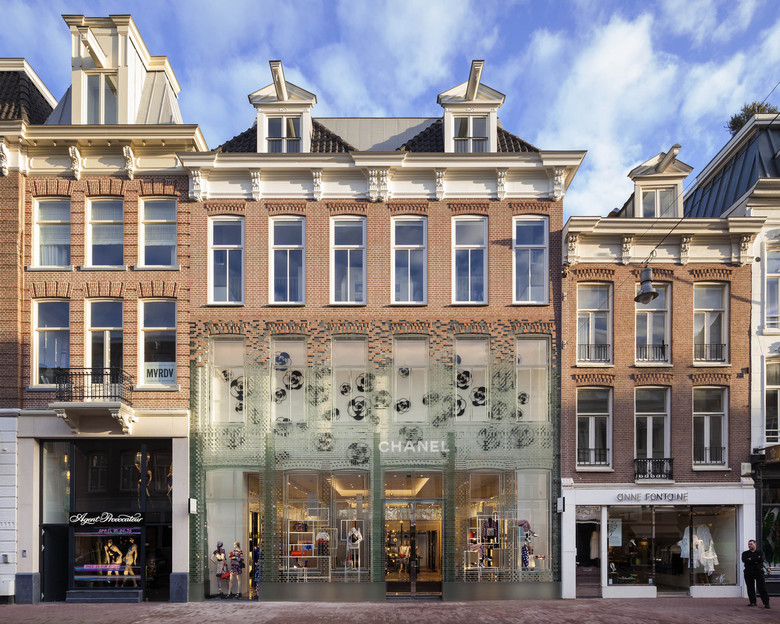From Brick to Crystal
The aptly named Crystal Houses in Amsterdam, designed by the Dutch architects at MRVDV, features a replica facade made of traditional terracotta bricks that dissolve into solid glass bricks at street level.
Crystal Houses is located on PC Hooftstraat, a formerly residential street that is now home to numerous flagship stores for luxury brands. To stave the architectural homogenization that arises in urban shopping areas, and to address the historic character of the street, MVRDV proposed to their client, investor Warenar, that the demolished building be recreated in glass and brick. Developing an innovative glass brick system, the architects gave the flagship tenant the transparency they expect, while covering the top-floor apartment with terracotta bricks in a more traditional vein.
Much like their earlier Glass Farm "farmhouse" in Schijndel, Netherlands, where images of brick walls, shuttered windows and thatch roofing are printed onto plate glass, MVRDV's Crystal Houses explores how glass can be incorporated into historical ensembles. Winy Maas, principal at MVRDV, sees the glass bricks mimicking traditional bricks receiving wider application: "Crystal Houses make space for a remarkable flagship store, respect the structure of the surroundings and bring a poetic innovation in glass construction. It enables global brands to combine the overwhelming desire of transparency with a couleur locale and modernity with heritage. It can thus be applied everywhere in our historic centers."
In one sense the application of the Crystal Houses' glass bricks in other historic areas is logical, since the time and expense for the research and testing ("six to ten experts worked every day for a whole year" per the architects) that went into the glass bricks and their assembly can be spread out across more than just this little project with 620 m2 of retail and 220 m2 of housing. Specifically, the glass bricks merge handcrafts and material research. To quote MVRDV again: "Solid glass bricks were individually cast and crafted by Poesia in Resana, near Venice. Research undertaken by the Delft University of Technology, in partnership with engineering firm ABT and contractor Wessels Zeist, led to the development of structural solutions and fabrication techniques, with the use of a high-strength, UV bonded, transparent adhesive from Delo Industrial Adhesives in Germany to cement the bricks together without the need for a more traditional mortar."
Most of the press – and their is plenty, given the striking result – hones in on MVRDV's assertion that "the glass-construction was in many ways stronger than concrete. The frame around the full-glass architrave, for instance, could withstand a force of up to 42,000 Newton; the equivalent to two full-sized SUVs." Credit for this accomplishment goes to the companies involved with developing the adhesives and how to apply them, as much as it goes to the people who made the glass bricks for this striking addition to Amsterdam's historic fabric.
Crystal Houses the movie was created by Robert Jan Westdijk for Warenar Real Estate with the help of people and companies involved in creating Crystal Houses.
PROJECT CREDITS
Architect
MVRDV
Design Team
Winy Maas, Jacob van Rijs and Nathalie de Vries with Gijs Rikken, Mick van Gemert and Renske van der Stoep
Co-Architect
Gietermans & Van Dijk Wim Gietermans, Arjan Bakker, Tuğrul Avuçlu
Manufacturer glass bricks
Poesia (brand of Vetreria Resanese): Ivano Massarotto
Importer of Delo glue
Siko: Rob Janssen
Contractor
Wessels Zeist: Robert van der Hoef, Richard van het Ende, Marco and Ronald Van de Poppe
Constructor
Brouwer&Kok: Paul Brouwer
ABT: Rob Nijsse
Research
Delft University of Technology: Frederic A. Veer, Faidra Oikonomopoulou, Telesilla Bristogianni
Municipality aesthetics commission
Wealth: Charlotte ten Dijke, Ellis van den Hoek, Natasha Hogen, Patrick Koschuch, Alexander Pols, Gus Tielens, Marcel van Winsen, Pepijn Diepenveen







